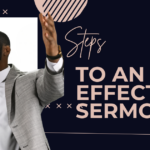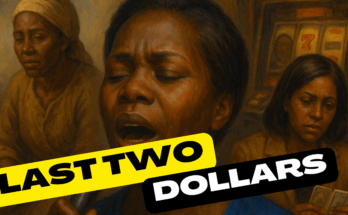- Black Preaching Myths – Is It Only For Black People?
- Black Preaching Myths – Black Preaching And Style
As an Amazon Associate I earn from qualifying purchases.
Some have the idea that Black preaching is only for Black people. You “preach Black” when you are in front of Black people and you “preach White” while in front of our Caucasian brothers and sisters. One wonders what are you supposed to do when preaching in front of a evenly ethnically mixed congregation.
This misconception is largely based in the idea that Black Preaching is just about style. We have already discussed that myth at this link. You shout loud while in front of Black people and you keep your volume down while in front of other groups is this faulty idea.
However, this is a myth that robs Black preaching of its ability to communicate to all. As Sherman Cox notes, “Black Preaching is not about WHO will hear our preaching, but WHO is preaching.”
No we preach to “whoever is sitting in front of us,” but we come to the text with a mindset that is born in the unique experience of being the outcasts of society. That angle on the text allows the Black Preacher to speak to all who have been alienated from the dominant. We can speak to those who have been set aside because we come from a group that has been set aside. We can speak to the depths of pain that only those who have been marginalized can feel.

No!! Black Preaching is simply what we do as Black Preachers. We may alter the style somewhat in different locales, but we are still obedient to the Master who calls for us to remember “the least of these” in all of our preaching and messages.
Amazon and the Amazon logo are trademarks of Amazon.com, Inc, or its affiliates.









I am white and I preach black style, even in churches where there is mostly white people in attendance. I found that it doesnt make a differance of what race the preacher is. Just being humble before God and in His love. What matters is like what Paul said, speaking the Word in the Holy Spirit. Even though I preach black style, when someone else is preaching, I am not emotional in my response, but rather am still and quiet because that is how I receive.
“Black Preaching” is birthed from the Black experience. The true derivative should come from the depths of blacks who have been or is exposed by: poverty, pain and prejudice. If anyone has ever experienced these circumstances as an African American, the plea/petition to the audience in which the Lord Jesus cares so much about- it is an echo of an urgent case matter!
The message should always include illustration and application. In some ways the Hoop/Black preaching at times has made this happen. This homiletic: the art of black preaching can have its effect of making the message more applicable to the hearer. If the listener/hearer receives the information, then communication was achieved. If a soul decides to a change and gives his/her life to the Lord Jesus; then this method/art has been effective. I feel that my seminary professors would be somewhat disappointed by my homiletic as an African American (seeing it as barbaric or a wasted education); but what really matters is the “needed method” for a particular context.
If black preaching is considered an art of preaching, why is it criticized? Oh Yea, there has been too little life transforming content and too much “celebration of worship”! There is a song: What if God is unhappy with our praise; what if he is not pleased with the words we say-
We must remain true to the intent of the original biblical author who was inspired by God to write these words: All Scripture is inspired by God and profitable for teaching, for reproof, for correction, for training in righteousness (2 timothy 3:16).
It is not what God has said it is about what God is saying. These “timeless principles” {Scriptures} make their application in this contemporary context as well as it did in the traditional context.
“What we preach out is a part of an inner transformation”- Elder Calvin Robinson
I love it when black preachers structure their sermon both exegetical, and expositorially from scriptures, I ‘ve notice, when their illustrations parallel what the scriptures are saying, it draws me to be very attentive, awaiting the application a starving attitude of “what must I do Lord?” Black preaching has great potential, it is something to be imitated, but not duplicated, for who knows the heart of a black man, no one but God and that black man, and most of his preaching come from deep within the heart that have experience hurt and have the experience to help others…